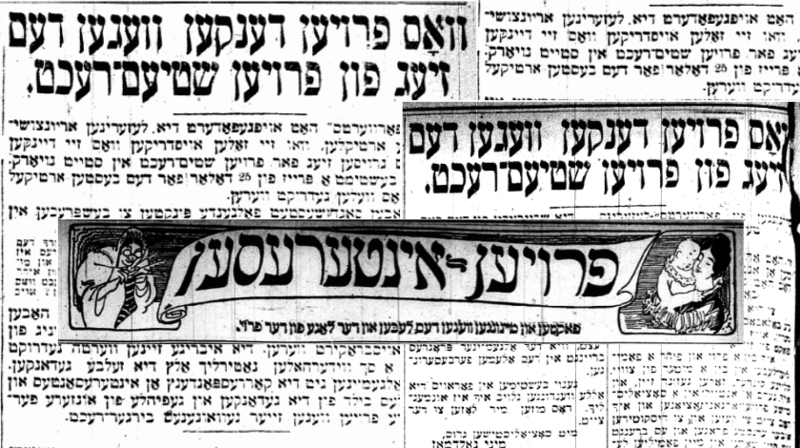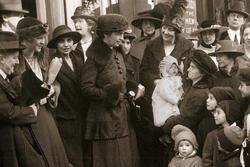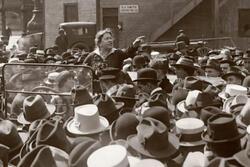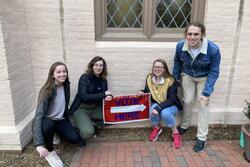"Froyen Interesen": How Yiddish Newspapers Addressed Suffrage Before and After Women Won the Right to Vote
This essay is part of JWA’s 2020 Suffrage Series on the blog.
As the suffrage movement picked up steam in the US around the turn of the 20th century, American newspapers increasingly engaged in the debate surrounding a woman’s right to vote. But English-language newspapers were not the only publications to take notice; Yiddish publications were hotly engaged in the discussion as well, amplifying the voices of both suffragists and anti-suffragists within the Jewish community. Before the Nineteenth Amendment’s passage in 1919, women won the right to vote in the state of New York in 1917, and Jewish communities of voters were key to passing the referendum. Yet Jewish women still faced (subtle and not-so-subtle) scrutiny and obstacles as they worked to claim their right to vote, struggles that were documented and amplified in the Yiddish press.
As I set out in search of early 20th century suffrage coverage in Yiddish-language publications, I paid a visit to the newspaper that felt most fitting to start with: the daily Yiddish newspaper Forverts. The New York-based Forverts newspaper was among the most widely circulated in the country at the time (read more widely even than The New York Times by the 1920s). When women won the legal right to vote in the state of New York in November 1917, Forverts put out a call to women for essays on their thoughts about their newly won local voting rights. The paper promised a prize of $25 (approximately $470 in 2020) to the best essay on the subject. A month after the referendum passed, responses were published under the “Froyen interesen” (“women’s interests”) section of the paper.
Over several weeks, Forverts published essays under the headline “Vos froyen denken vegn dem zieg fun froyen shtiem-rekht” (“What women think about the victory of women’s voting rights”). Though the topics varied in the suffrage-focused Yiddish prose each week, I found the essays commonly filled with rebuttals to anti-suffrage talking points. Essayists focused on and took apart the idea that women would fundamentally change—that women would drop all responsibilities, abandon their children, and no longer be the center of the Jewish home—if they could vote.
One Forverts essayist, Eyde Val of 45 Norfolk Street, writes: “They say that this will be a foolish conflict between man and wife for politics, and that the wife will treat the house cavalierly…To this I answer: What about Jewish men who become citizens? Do they act differently in their homes? Are they different? [No, and] it’s foolish to say otherwise. If she won’t be a better baleboste, she certainly won’t be a worse one for voting.”
Forverts essayists like Val chose to focus their essays on countering anti-suffrage talking points under a section of the paper that was supposed to be dedicated to their thoughts on a suffrage victory. As I was reading these essays, I couldn’t help but wonder: Why would Jewish women feel compelled to use this space to counter anti-suffrage arguments after their right to vote had already been won?
An estimated 76 to 93 percent of the total vote in New York City districts with large Jewish populations was pro-suffrage in the 1917 referendum; yet, Jewish women were still faced with overt and covert hostility to women's involvement in the political process. Though legal limitations to women’s suffrage had been eliminated in the state of New York, the social limitations had not.
In 1909, nearly a decade before women won the right to vote in New York, a Forverts reader wrote to a different section of the paper, the Bintel Brief advice column, about the topic of women’s suffrage; this letter offers some insight and context for the essayists’ responses following the successful 1917 referendum.
The letter writer, who signs the message “With Socialist regards, LV,” tells the Forverts editor that he was surprised to hear that many members of his conversation group, after reading and discussing together an article in a newspaper about the women’s suffrage movement, were afraid that women would abandon their families, their household work, and their current lives if given the right to vote. He notes that members of the group said that a woman “must not mix in politics.” Sound familiar?
In the response, the Forverts editor affirms LV’s stance and states that “many intelligent women are already taking part in various activities and they still remain excellent homemakers.” When I read this section of the editor’s response, I thought it was, well, not great. Yet his assertion, that women are able to pursue their passions and still remain great balebostes, homemakers, is grounded in the arguments of his contemporary suffragists, and this point would later be echoed by the aforementioned Forverts essayists in 1917. Through the Bintel Brief letter, we encounter the same fears addressed by Val about suffrage a decade later. Were conversations not so dissimilar in New York in 1917 to those among LV’s group in 1909?
Although the referendum passed in November 1917, anti-suffrage sentiment did not instantly dissipate in New York. Miriam Karpilove’s article “Women’s Rights,” originally published in Yiddish newspaper Di varhayt and translated by Yiddish scholar Jessica Kirzane for Jewish Currents, covers the March 1918 election, the first opportunity for women to exercise their right to vote in New York. In the article, Miriam Karpilove documents men harassing women at her polling center and an exchange she has with one of the men herself. In her introduction to the translation, Jessica Kirzane describes the piece as “a public performance of exactly the kind of bold feminine voice that the men she depicts in this piece were afraid might emerge out of women’s suffrage.” Even if the tide changed politically, the issue remained culturally charged in New York. The Forverts essayists and Miriam Karpilove address an issue outlasting a change in politics: a culture still hostile to the idea of women voting.
As we reflect on the experiences of our foremothers, we must recognize that anti-suffrage sentiment didn’t disappear with the referendum’s passing in New York in 1917 or with the ratification of the Nineteenth Amendment. Unfortunately, voter suppression in this country did not end in 1918 with the publication of Miriam Karpilove’s article. Poll taxes and literacy tests kept Black voters disenfranchised until the 1965 Voting Rights Act outlawed these practices. In 2013, the Supreme Court gutted the Voting Rights Act, and trans, immigrant, disabled, and POC voters are particularly vulnerable today as a result. In preparation for (and as part of current engagement in) the 2020 elections, know your rights, and continue the fight that started long before the centennial we mark this year. Defend voting rights with big baleboste energy.
Yiddish Translations:
Quotes from the Bintel Brief letter and response translated by Isaac Metzker.
Quote from Eyde Val's Forverts essay translated by Sarah Quiat.








Awesome research and writing Sarah!!